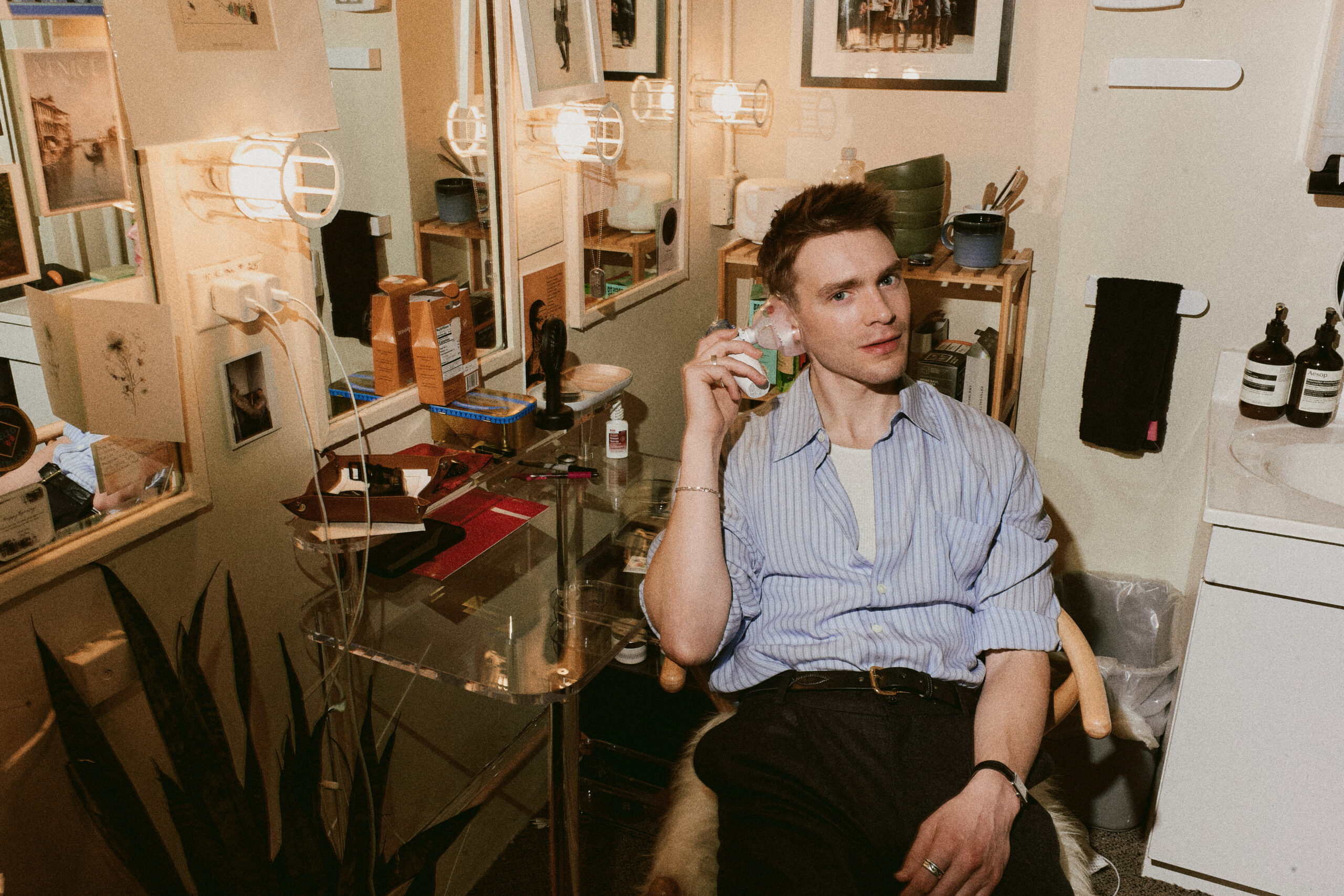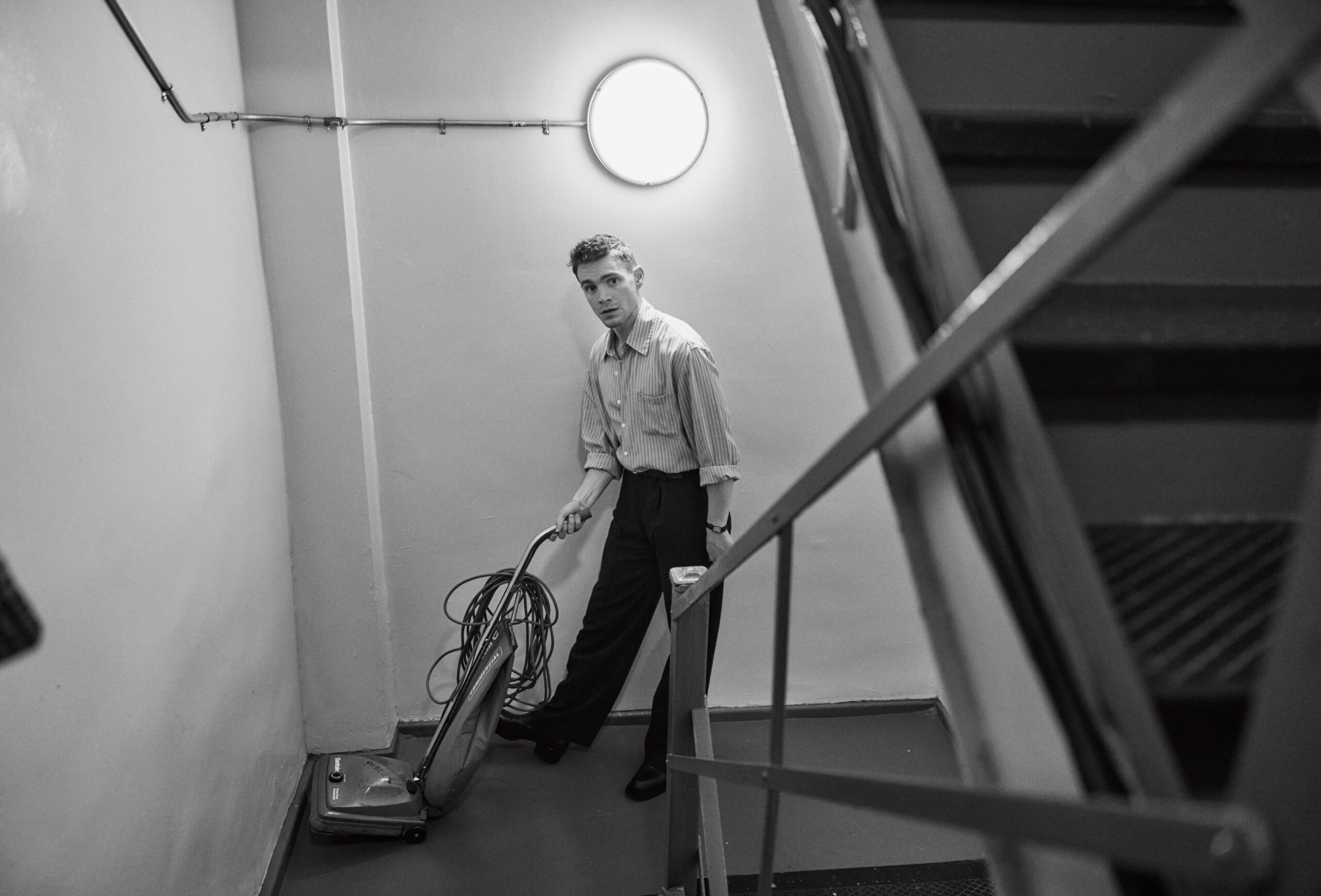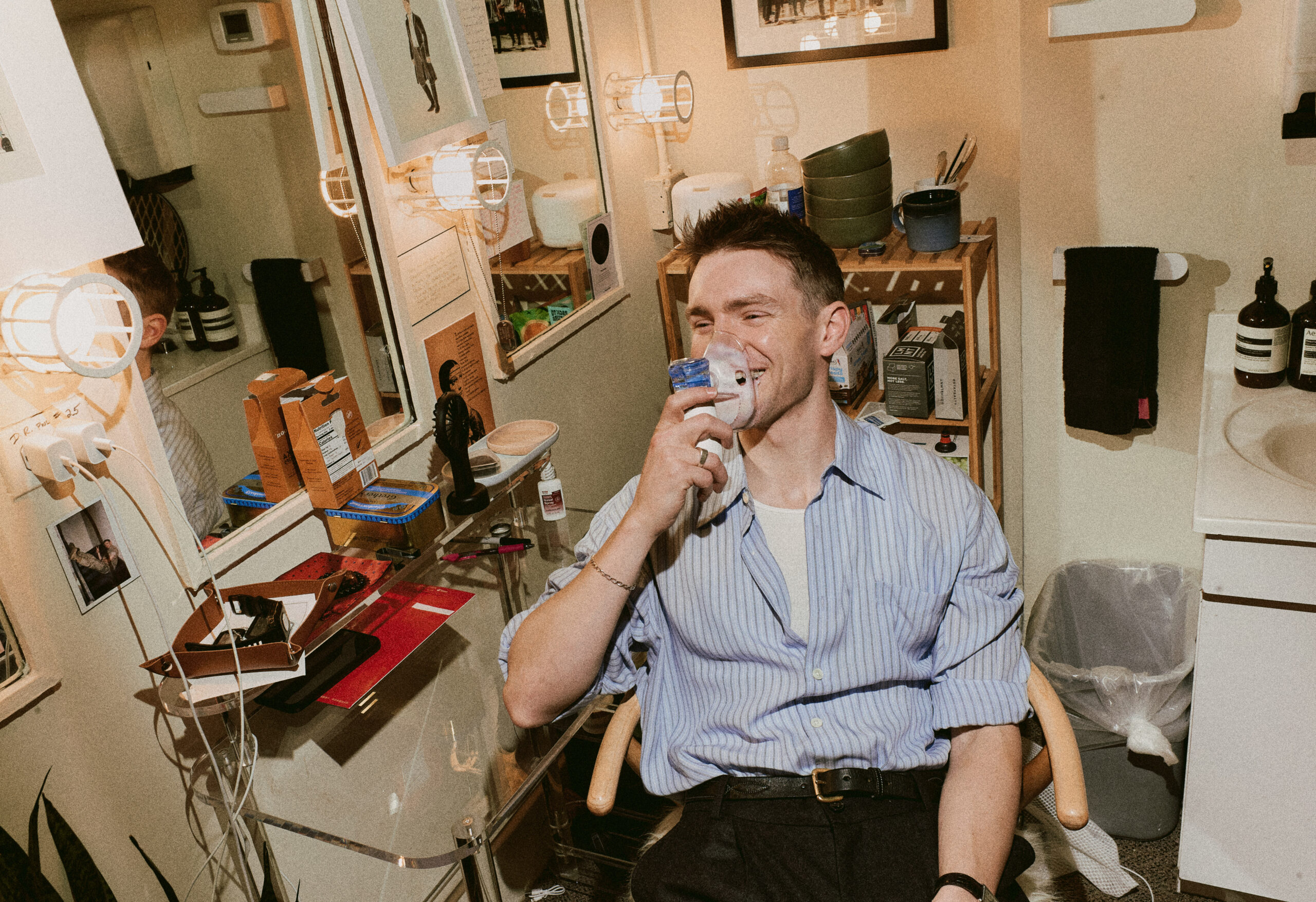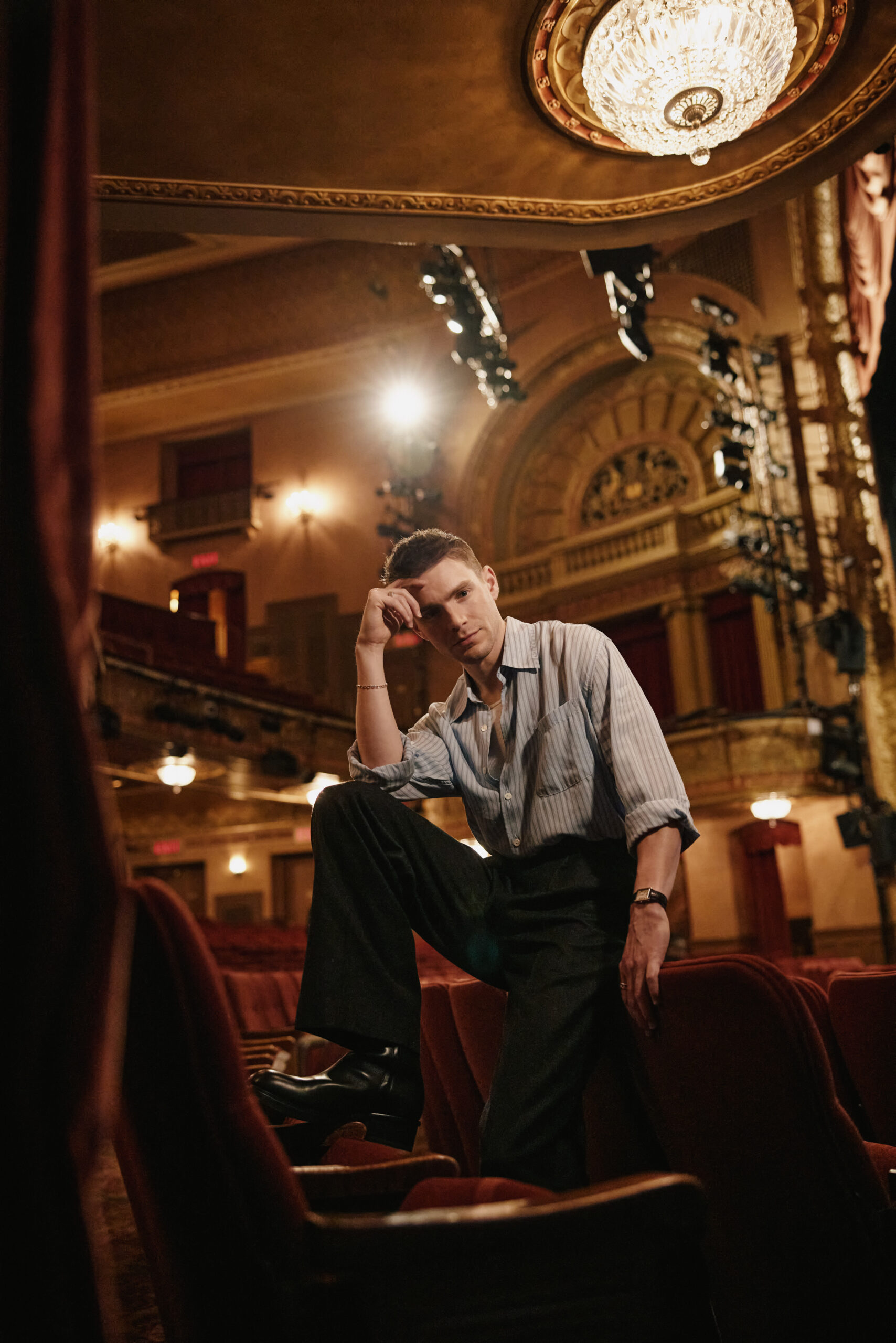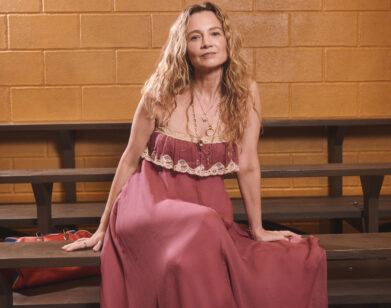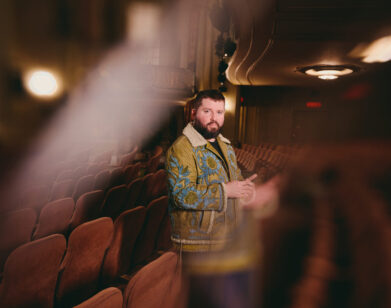BACKSTAGE
Andrew Burnap Takes Jeremy O. Harris Inside Broadway’s Record-Breaking Othello
When Andrew Burnap was first offered the role of Cassio in director Kenny Leon’s ballyhooed revival of Othello, now running at the Ethel Barrymore Theatre through June 8th, he wasn’t sure just how attractive a part it was. Sure, he’d be working with Denzel Washington (in the title role) and Jake Gyllenhaal (as Iago), but Cassio functions mainly as Othello’s loyal footsoldier, steadily and unwittingly moving the play’s tragic plot forward. But it wasn’t long before Burnap took a closer look at the source material, which he’d last read as a student at Yale. “In a way, Cassio is the crux of this plan and the play,” the 34-year-old actor told Jeremy O. Harris earlier this month, shortly after the show’s record-breaking opening week. “I realized that this is a guy who, in today’s world, I’m really fascinated by. He’s someone who’s obsessed with how people perceive him. And with the internet, Twitter, and Instagram, public perception is kind of everything.” Burnap learned that in his first few forays into Broadway, where he earned the Tony Award for Best Leading Actor in a Play for The Inheritance, an ambitious, two-part epic that polarized just as many theatergoers as it profoundly affected. “New Yorkers will tell you exactly how they feel about everything you do,” he confessed. “This time on Broadway, I feel a little more deserving, like I’m here and I’ve put the work in.” To drink in the moment, Burnap joined Harris over Zoom to talk about overcoming self-doubt, working with two titans of the entertainment industry, and why he was born to star in a Chet Baker biopic.
———
JEREMY O. HARRIS: How are you, darling?
ANDREW BURNAP: I’m good. How are you, baby?
HARRIS: I’m good. Our dinner the other night was so much fun.
BURNAP: I know. Although I have to say it did go through me rather quickly.
HARRIS: Oh, in a bad way?
BURNAP: In a bad way, yeah.
HARRIS: Are we actually going to start this interview with the scatological?
BURNAP: To be fair, it might not have been that food. It might have just been my anxiety passing through my body.
HARRIS: Listen, I’m not going to pretend like I did not have scatological situations the next day. I don’t know if it was because I’ve been steaming a lot or if it was that dinner. I’ve been going to Bathhouse, but I heard people are getting UTIs at Bathhouse Flatiron and Bathhouse Williamsburg. That made me really sad because I thought I’d finally found community.
BURNAP: Wait a minute. How?
HARRIS: I don’t know. They’re getting UTIs. I see a lot of straight people getting frisky together in the little hot tubs. Bathhouse culture in New York– like most queer things in New York– has been appropriated by straight people now. They’re paying for very expensive bathhouse experiences where they can meet other single straights or come as a couple and sort of get flirty and show off their gym body that they hide in suits in their corporate jobs every day.
BURNAP: Then leave the UTIs behind for everybody else.
HARRIS: Yes. Well, this leads me to a question for you. How do you unwind in a show like this? I know some people in shows on Broadway like to get their weekly Reiki. Some people are getting their weekly acupuncture. Does any of that work for you?
BURNAP: I get a weekly massage and then I have therapy once a week. I get to just say anything I want to this beautiful person who knows nobody else in my life. Then I get this massage here in Brooklyn Heights that just drains my body of everything that’s making me upset or making me anxious. It’s like a deep tissue massage and it’s painful.
HARRIS: I love a painful massage.
BURNAP: You can’t have a non-painful massage.
HARRIS: Where’s your tension?
BURNAP: My tension is all in my shoulders. Every time a massage therapist goes in on that area, I’m weeping on the table.
HARRIS: Mine is in my scapula. It’s the shoulder blade.
BURNAP: Oh, underneath. Do you find it’s an emotional knot or it’s a physical knot?
HARRIS: I think it’s both emotional and stress-related. What is your shoulder tension from?
BURNAP: It’s all emotional.
HARRIS: It is?
BURNAP: Yeah, it all gets let out anytime they’re massaging here. An Alexander [technique] teacher once told me that if you have problems with your back, it is usually emotional stuff.
HARRIS: I think I’m like Cassio. See how I’m bringing it back to the play?
BURNAP: Love it.
HARRIS: In that I have a great mask for everything that’s going on inside of me, for all of my ambitions, for all of my anxieties. I don’t like anyone to see me sweat or to be upset because I find it’s a waste of everyone else’s time. It’s like, “Why am I burdening people with that?”
BURNAP: Yes, I feel the same way. I think what’s interesting about Cassio is that when I first discussed doing this role, someone said to me, “Oh, Cassio is a small part. It’s not that great of a role.” But I think Cassio is a character in the play who still gets a multifaceted portrayal; he wears a different mask for Othello compared to his mask for Iago, which is very different from his mask for Desdemona and Bianca. You see this person leading with a different aspect of himself for each person because he cares so much about how he’s perceived by others.
HARRIS: What’s really interesting about that is that, because he’s so hidden from both himself and his various audiences within the play, the audience doesn’t realize how significant his role is. As I watched the play this time focusing on your arc I thought, “Oh wait, Cassio is the foil to Desdemona.” There’s an argument that Cassio is the nucleus of the play in some ways: Iago not getting the position that Cassio got fuels his frustrations and desires, which he then projects onto Cassio. He then transfers that over to Othello and becomes obsessed with Cassio as this person who’s more sexually free, younger, more beautiful.
BURNAP: Yes, without Cassio, Iago’s plan doesn’t work.
HARRIS: Did you do this play at Yale?
BURNAP: No, I’ve never done this play. I saw it at Yale in my third year and worked on it in readings along the way, but I’ve never done a full production.
HARRIS: Wow.
BURNAP: I know.
HARRIS: When you got offered the play, did you have a moment where you thought, “Wait, this whole play might be about me?”
BURNAP: Exactly what you just said happened in my head within 10 minutes. My first thought, since I hadn’t read the play in a long time, was “Oh, Cassio’s not that great of a part.” Then I went to my Shakespeare app.
HARRIS: We love the Shakespeare app. I’m on it all the time.
BURNAP: It’s the best.
HARRIS: When Cassio does all the lines about being drunk, I thought, “There’s no way they say ‘drunk’ this many times.” But they do. I read it immediately at intermission.
BURNAP: Funny enough, an audience member came up to me and said, “You added too many laughs in your scene.” I pulled up my Shakespeare app and it says, “Ha ha ha,” then there’s a line, and at the end of the line, another “Ha ha ha.” Our boy Willie wrote that. Anyway, when I looked in my Shakespeare app, I realized, in a way, Cassio is the crux of this plan and the play. Then as I went through it, I had that classic thing of counting how many lines I had. I realized that this is a guy who, in today’s world, I’m really fascinated by. He’s someone who’s obsessed with how people perceive him. And with the internet, Twitter, and Instagram, public perception is kind of everything. So I really wanted to do this because I’m interested in how this feels to people’s ears today. If you read any great Shakespearean scholar, why Othello picks Cassio and why Iago makes this his plan will probably always be the great question.
HARRIS: Do you have an opinion as to why Iago does this?
BURNAP: He says it at the beginning, that he’s pissed off.
HARRIS: Yeah, I think it’s literally someone who’s anti-DEI, right? He’s like, “So you picked a black man to be general. I guess he’s the best soldier, but is he really? He’s Black.” Then it’s like Pete Hegseth deleting everyone in the DOD who’s Black and a woman. I think there’s something to the “Is Cassio gay?” of it all. There is something where he’s kind of like, “You pick this queen over me. That makes no sense. He’s barely a man. He sleeps with prostitutes unmarried. When he sleeps with me, sometimes he throws his legs around me,” or at least it’s believable enough that he could do that.
BURNAP: I know. That passage is always up to everyone who stages this play. When Iago tells Othello, “I lay with Cassio lately,” it’s up to everyone to decide if that’s true or not. If it is true, are they two soldiers laying next to each other in war and that’s just how it goes? Or is there something more to it?
HARRIS: Yes.
BURNAP: You have to discuss that and make that decision, especially for modern audiences who are going to hear that. We get reactions to it every night.
HARRIS: What are people saying?
BURNAP: I think people mostly laugh at the seeming absurdity of the story and that this person would try to convince this great general it’s true. When I’ve seen it before, those are the questions in my head. Did that actually happen? What’s the story behind it? If it didn’t happen, what a crazy lie to tell this guy who then just believes it.
HARRIS: Yeah. It’s wild. I mean, Bianca and Desdemona were both played by boys back then, but there is so much more of an energy and a charge towards imagining being cuckolded by another man, which in and of itself is homoerotic. Was there any chatter about that or what it might mean? Was it all just under the surface?
BURNAP: I think a lot of it was under the surface. It was mostly a conversation with Jake, Kenny [Leon], and Denzel about these multiple stories that Iago tells and whether or not they’re true. I think that’s usually up to Jake to decide.
HARRIS: What was it like working with Jake in liar mode?
BURNAP: I love Jake Gyllenhaal. He’s a real champion of theater, as you know. I think he really believes in its sanctity and power. He’s one of those actors, in my experience, who always searches to get better and comes from a place of real humility. I don’t think he’s done much Shakespeare before this. He came in knowing all the words. I also just find him to be a delightful person.
HARRIS: He came in knowing all the words?
BURNAP: He came in knowing all the words.
HARRIS: Did Kenny ask you guys to know all the words?
BURNAP: No, I think Jake just has a work ethic where he’s like, “Okay, this is a chance to expand my artistry and I’m not going to miss this opportunity.”
HARRIS: That’s wild. You’ve been on Broadway basically three times in the last four years, right?
BURNAP: Wait, is that right?
HARRIS: Maybe five years, three years, I’ll say four years. We’ll skip the pandemic year. You’ve been on Broadway a significant amount of time. What has been the biggest difference between your first time on Broadway to now?
BURNAP: I think the first time I was so intimidated by it. As a kid, my dream was to do this. All of our dreams were to do this. There was real pressure not to screw it up, which caused me a lot of distress, but also kept me trying to be as good as I possibly could. But sometimes, that’s death—trying to be a good actor. My first professional job was Troilus and Cressida in the park and I put so much pressure on myself to be a good actor that I thought about all the wrong things.
HARRIS: What were some of those wrong things?
BURNAP: I thought about how to be a good actor. But the way to be a good actor is to surrender to it all, get on stage, talk and listen. As cliche as it sounds, you have to be in the present moment, be with your scene partner, respond, and let people think you’re great if they want to. Trying to be a good actor puts you outside of the actual experience. I was so hard on myself and took everything personally. I’ve learned to have a thicker skin along the way, but I’m a Pisces, that’s really hard for me.
One of my favorite experiences was on an elevator about to do a show and this lovely older woman comes up and says, “Are you in the show?” I said, “Yeah.” She asked, “Who are you?” I said, “I’m Andrew.” She goes, “Andrew, yes, I saw you in The Inheritance and Camelot. I loved The Inheritance. But Camelot…” 10 years ago, I would have had a panic attack, but I was able to laugh with her and say, “I thank you for the compliment on The Inheritance. I’m sorry you didn’t enjoy Camelot. You’re going to love this one.” So now, leaving room for people’s opinions is part of my life.
HARRIS: Their unsolicited opinions.
BURNAP: New Yorkers will tell you exactly how they feel about everything you do. This time on Broadway, I feel a little more deserving, like I’m here and I’ve put the work in.
HARRIS: I love that. You are in a play that deals a lot with not only masculinity but how jealousy can warp even the kindest, most generous of men and turn them into monsters. Is jealousy something you ever have to deal with? What awakens the beast inside you? Does you rage only come out when you’re losing at Monopoly?
BURNAP: It’s funny you ask about Monopoly because I can’t play it anymore.
HARRIS: Is it literally Monopoly for you?
BURNAP: Monopoly and Risk. I have a vivid memory of playing Monopoly with some high school buddies. I landed on a property and had a momentary lapse in awareness. I was supposed to collect money from someone, but they rolled the dice before I could realize it. They said, “No, you don’t get to collect. It’s now my turn. Those are the rules.” I flipped the board. The game was over. That’s where that rage comes out for me, in board games. But really, you have to have an outlet to channel the nonsensical rage and the things that make no sense, like the amount of work you put in and the reward you get on the other side never being equal.
HARRIS: I have been very blessed, and I’m sure you feel the same way, but the numbers that people think I have in my bank account based on how often they’ve seen me in a magazine just don’t correlate. I was like, “Oh, I don’t think you know how much theater people or guest stars on a TV show make at all.”
BURNAP: Yeah. I still walk to the laundromat to do my laundry. I really do value the small things about my life that keep me in a place of just being a human doing my best.
HARRIS: Did you not glam out your dressing room? Is Architectural Digest not going to go through your dressing room?
BURNAP: No, not this time.
HARRIS: I saw Jake’s budget for his room. I was like, “What did Cassio get?”
BURNAP: I got a rug, a chair, a desk and some Aesop hand wash and cream, just a little bit.
HARRIS: Okay.
BURNAP: You have to find things in your life where the equation is equal. If you put a certain amount of work in, you get a certain amount of reward and that won’t change. In our careers, I don’t think that equation will ever be equal.
HARRIS: No. There must be something that pissed you off, like Drew Starkey or Paul Mescal must have stolen some role from you. What’s the one that got away that really upset you because you thought you had it?
BURNAP: Funny enough, the first real heartbreaking one for me that I didn’t get was The Goldfinch.
HARRIS: Wait, was that—
BURNAP: I think it was Ansel Elgort who played it. I really, really wanted that. I loved that book so much. When I didn’t get that, I thought it was over for me.
HARRIS: That’s also kind of crazy that it was Ansel. That’s kind of weird.
BURNAP: Oh yeah, because of West Side Story.
HARRIS: Let me be a bitch for a second.
BURNAP: I mean, there are probably more movies I didn’t even come close to getting. But I’ve done a really good job of doing something and then forgetting about it as quickly as possible.
HARRIS: That’s a real actor.
BURNAP: In and out. “Thank you so much. We’ll call you.” No, you won’t.
HARRIS: I haven’t done many auditions since forever, but I feel deeply that when Paul Thomas Anderson saw Slave Play, there was an opening there for us to collaborate. I genuinely think that had I played my cards better when he sent me an email after he saw Slave Play, I would’ve been in Soggy Bottom. But I really flopped. I sent a really crazy email back. I fangirled too hard.
BURNAP: Yeah, but why not fangirl?
HARRIS: Who have you fangirled on that made it feel good?
BURNAP: I fangirled hard on John Lithgow and that felt really, really good. I love John Lithgow with all my heart. One of the most generous, kind and just beautiful actors. I fangirled hard and felt great about it. I might be too nervous to really fangirl in person. I could send a fangirl email like nobody else, though.
HARRIS: After I saw The Glass Menagerie, I sent Joe Mantello an insane fangirl email. It maybe could have gotten me a restraining order. The emails to him and to Ralph Lemon were the two where I read them after and was like, “Calm down.”
BURNAP: I love it.
HARRIS: Okay. You’ve done Shakespeare on Broadway, you’ve done an epic new play. You’ve done a musical. I didn’t even know you could sing.
BURNAP: I can hold a tune.
HARRIS: What’s the next thing you’re going to tackle?
BURNAP: Jeremy, I really, really want to play Chet Baker.
HARRIS: What?
BURNAP: I want to play Chet Baker.
HARRIS: Wow. You have the jawline for it and you didn’t pay for it. A lot of people paid for it.
BURNAP: I grew up playing the trumpet.
HARRIS: What?
BURNAP: Yes.
HARRIS: Wait, okay, so you’re auditioning right now?
BURNAP: No, I’m asking you to write a story about Charlie Parker and Chet Baker.
HARRIS: Wow. You want me, as a Black man, to write a movie about Chet Baker?
BURNAP: I want you as a great writer to write a story about a person that I want to play.
HARRIS: I love that. I mean, I want to write for you so badly.
BURNAP: Chet Baker has the most fascinating life. I mean, talk about someone who was wounded by love. This man grew up playing the trumpet better than anybody else. He then got in a fight outside of a bar, lost his teeth, couldn’t play the trumpet, had to relearn how to play this extension of himself without his teeth, and then released some of the greatest music ever known to man.
HARRIS: Can we do it on stage first?
BURNAP: Yes. We have to do it on stage first.
HARRIS: What’s the book I need to read?
BURNAP: I’m going to send it to you. There’s a biography about his life that has so much information it’ll make your head spin, but you will fall in love with this man just as I did.
HARRIS: How good of a trumpet player are you? Scale of one to 10.
BURNAP: Right now I’d say I am a four out of 10. I used to be a six out of 10, but I could get to eight out of 10.
HARRIS: You can get to eight?
BURNAP: I can get to eight, yeah.
HARRIS: Because listen, we’re going to have instruments. I’m not messing around.
BURNAP: Oh, nobody will be messing around.
HARRIS: I’m happy you’re on Broadway in this show. What is the craziest thing that’s happened in rehearsal? Leave me with that. Because, I mean, you’re doing a show with two of the biggest movie stars ever. There must’ve been something wild. Did someone get a private jet from Scott Rudin to come do a reading somewhere?
BURNAP: I mean, there haven’t been that many crazy things that happened in rehearsal other than you’re in a room with Denzel Washington and Jake Gyllenhaal getting messy and going crazy and trying to figure out how to do this play. I mean, that in and of itself is crazy. I would say the coolest thing that happened in rehearsal is we were able to hear from a lot of former soldiers who told us their stories, which was harrowing and moving and beautiful and at times hilarious. And I think probably the craziest thing that happened is that we got through our final room run and—
HARRIS: What was wild about the final room run? How long was it, because the play is like three hours usually. You guys cut it down a lot.
BURNAP: I think the final room run was like two hours and 50 minutes, or maybe around three hours, but this play has so much in it. You spend so much time trying to figure it out. In the American theater, you’re given four weeks to stage this incredibly complex play. I mean, you could spend a year trying to stage this play and still probably not plumb all the depths.
HARRIS: Yes.
BURNAP: I remember we had a real sense of like, “Woah, we did it,” when we got through that final room run and then they sent us into tech and then all those previews. I mean, one of the most fun things is that my dressing room is by the stage door and I can hear all the whoos coming from the crowd. So I know exactly who’s leaving the door each time based on the level of whoo.
HARRIS: Oh, wow. Do you get disheartened when your whoo is less of a whoo?
BURNAP: No, never. I know who they’re here to see. I mean, I’m trying to do my best and maybe I’ll get a couple of people who are whooing for me. Sometimes, because the show does take a lot out of you, you’ve just got to duck and run, blow a big kiss to everybody, and get home.

